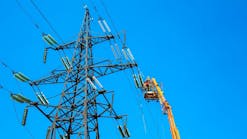Biden’s ‘American Jobs Plan’ Calls For $100bn Investment In Such Matters As Electric Resiliency
President Joe Biden’s “American Jobs Plan” calls on Congress to invest $100bn to, for instance, build a more resilient electric transmission system, according to a March 31 fact sheet from the White House.
“As the recent Texas power outages demonstrated, our aging electric grid needs urgent modernization,” the fact sheet said, adding that a U.S. Department of Energy (DOE) study found that power outages cost the U.S. economy up to $70bn annually.
According to the fact sheet, Biden’s “plan will create a more resilient grid, lower energy bills for middle class Americans, improve air quality and public health outcomes, and create good jobs, with a choice to join a union, on the path to achieving 100 percent carbon-free electricity by 2035.”
Noting that grid investments allow moving cheaper and cleaner electricity to where it is needed most, the fact sheet said that Biden’s plan calls for the creation of a targeted investment tax credit that incentivizes the buildout of at least 20 GW “of high-voltage capacity power lines and mobilizes tens of billions in private capital off the sidelines – right away.”
Additionally, the fact sheet said, the plan will establish a new Grid Deployment Authority at DOE that allows for better leverage of existing rights of way (ROWs) – along roads and railways – and supports creative financing tools to spur additional high priority, high-voltage transmission lines.
According to the fact sheet, those efforts would create good-paying jobs for union laborers, line workers, and electricians, in addition to creating demand for American-made building materials and parts.
The fact sheet also noted that Biden is proposing a 10-year extension and phase down of an expanded direct-pay investment tax credit and production tax credit for clean energy generation and storage.
Furthermore, Biden’s plan aims to mobilize private investment to modernize the country’s power sector, the fact sheet said, noting that the plan will support state, local, and tribal governments choosing to accelerate that modernization through such complementary policies as clean energy block grants that can be used to support clean energy, worker empowerment, and environmental justice.
Under the plan, Biden will also establish an Energy Efficiency and Clean Electricity Standard (EECES) aimed at cutting electricity bills and electricity pollution, increasing competition in the market, incentivizing more efficient use of existing infrastructure, and continuing to leverage the carbon pollution-free energy provided by such existing sources as nuclear and hydropower, the fact sheet said.
In addition, Biden is proposing a $174bn investment to win the electric vehicle (EV) market, with his plan designed to enable automakers to spur domestic supply chains from raw materials to parts, retool factories to compete globally, and support American workers to make batteries and EVs, the fact sheet said. The plan will, for instance, give consumers point of sale rebates and tax incentives to buy American-made EVs, as well as establish grant and incentive programs for state and local governments and the private sector to build a national network of 500,000 EV chargers by 2030, the fact sheet noted.
Among other things, the fact sheet said that Biden is also calling on Congress to invest $35bn in the full range of solutions needed to achieve technology breakthroughs that address the climate crisis, including launching ARPA-C to develop new methods for reducing emissions and building climate resilience, as well as expanding across-the-board funding for climate research.
In a March 31 statement, Rob Gramlich, executive director of Americans for a Clean Energy Grid, said, in part: “The transmission tax credit and other policies in the Biden infrastructure plan will enable a couple dozen large scale transmission projects to move forward in the near term. The biggest barrier to large scale transmission, even more than siting and permitting, is that there is currently no functioning way to recover costs of the large scale interregional ‘highways’ that we need, through electricity rates or otherwise. We appreciate this administration’s focus on deployment and the promise of a Grid Deployment Authority.”
Separately on March 31, Gregory Wetstone, president and CEO of the American Council on Renewable Energy (ACORE), said, in part: “The direct pay option for renewable generation credits will go a long way toward accelerating the deployment needed to decarbonize the power sector by 2035, and new incentives for transmission and energy storage will be key to securing a more reliable, efficient and cleaner electric power grid.”
Wetstone continued: “The inclusion of a federal Energy Efficiency and Clean Electricity Standard is vital to ensure we stay on track with the critical emissions reductions needed to make progress addressing climate change. And the Grid Deployment Authority will make it easier to modernize today’s balkanized and antiquated grid infrastructure with an advanced Macro Grid capable of delivering abundant, affordable and reliable clean energy.”
In another March 31 statement, U.S. Energy Storage Association Interim CEO Jason Burwen said, in part, “From factory to grid to frontline communities, [Biden’s plan] has the policies needed to achieve our goal of 100 GW of new energy storage by 2030 to decarbonize our power system, make our infrastructure resilient and put Americans in every state to work in a globally competitive industry.”
Burwen continued, “Important parts of the American Jobs Plan — like the 48C tax credit and targeted grants to build or retool factories — promote needed increases in U.S. battery manufacturing capacity and a supply chain that is reliable and independent.”
As noted in the fact sheet, Biden is calling on Congress to invest more than $52bn in domestic manufacturers, as well as to invest in existing capital access programs with a proven track record of success, with a focus on supporting rural manufacturing and clean energy.
In a separate March 31 statement, Edison Electric Institute (EEI) President Tom Kuhn said, in part, that reaching a 100% “clean energy future will require new, carbon-free, 24/7 technologies that are affordable for customers.”
He noted that EEI and its member companies recently joined with technology and environmental non-governmental organizations (NGOs) to launch the Carbon-Free Technology Initiative.
Kuhn continued: "We also must get critical electric transmission and other energy grid infrastructure built more quickly. The transmission system is key to integrating more renewables, more clean energy, and more technologies into the grid affordably and reliably.”
Article amended at 4:18 p.m. EST on Wednesday, March 31, 2021, to include EEI’s comments.


